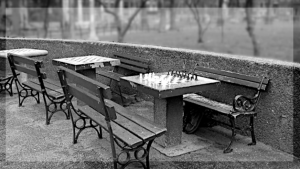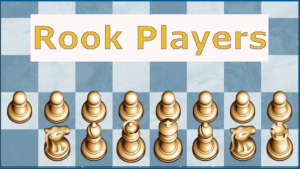
Buckle
If Buckle had entered the Tournament list [in 1851], and been pitted against Staunton, I think he would have proved victor, as the fine edge of Staunton's play was then taken off, a fact amply demonstrated in his matches with Anderssen and Williams. A contest, however, between the two masters, some years previous to this date, when Staunton was in his best form, would have terminated, I believe, in his favour. With all Buckle's superb genius for the game, he lacked something of the solid power, the unflagging patience, resource, and depth of Staunton, and in a set encounter with him, would, in my judgment, have had the worst of it.
—Hugh Alexander Kennedy

enry Thomas Buckle was born in the town of Lee in the county of Kent, near London, on November 2, 1821. Buckle was a delicate child and a slow learner. Even by the age of eight could hardly read.
He had an unsual upbringing. The family physician, Dr. George Birkbank, a once professor of Philosophy at the Andersonian Institution in Glascow, who earned his MD at the University of Edninburgh Medical School and who founded the first Mechanical Institute in England while giving free lectures to the public on the Mechanical Arts, proscribed a rather peculiar regimen for little Henry Buckle. Birbank suggested that Buckle use his brain as little as possible in schoolwork. Henry was sent to a day school in Kentish Town with the strict instructions that he must never receive physical punshment and that he must not be pushed to study any more than he liked. However, there he won a prize in mathematics. He quit school at 14 and after a short period with a private tutor, his formal schooling ended. His father tried to interest him in the family business by making him go to work with him, but Buckle developed an aversion to that sort of employment, though later he credited that time with the development of those organizational habits important to a historian.
When his father died in 1840 he inherited interest in a business as sea-going merchants, "Buckle, Bagster & Buckle," but just lived off its proceeds, freeing himself to pursue historical research and chess. Upon the death of his his father, Henry suffered from seizures and fainting spells and so, accompanied by his mother, he toured Europe for a change in scenery. He visited Belgium, Germany, Holland Italy and France. During his travels he developed profoundly what he already knew to be a facility with languages. In all Buckle learned to speak French, German, Italian, Spanish, Portuguese, Dutch and, of course, English with a reading knowledge of nine others, not including Latin and Greek which he could also read. For some reason Buckle did not care for art and considered music to be little more than intrusive noise.
While in France he had met with Keiseritzki and St. Amant, and was able to beat them both when receiving pawn odds. This trip instilled in him a love of traveling and later he traveled extensively learning languages, collecting books and honing his chess skills against a more cosmopolitan field of opponents.
Buckle receiving Pawn odds from Kieseritsky:
Buckle playing Hanstein in Berlin:
Charles Tomlinson tells us:
Buckle's strong play led him into some curious adventures on the Continent. For example at Dresden, after watching some chess players in a cafe, one of them challenged him. The German played carelessly at first, but soon acquiring a taste for Buckle's quality, bestowed more attention on his game. After receiving check-mate, he got up and made a profound bow, saying "Whoever you are, you should play only with the best players." Buckle did so, and soon got a reputation in the place, but one man spread a report that refused to play with so an inferior man as Buckle, whereupon Buckle posted up a large placard challenging the man to play a single game for five hundred dollars. It is scarcely necessary to add that the challenge was not accepted. On another occasion, at Rome, while watching a game, he was invited to play for a scudo. Buckle assented. "Or perhaps a couple of scudi!" the man added. Buckle agreed. "Well, perhaps it would make a better game if we were to play for five scudi, if you like." But the man declined, probably suspected that he had a strong player before him. When at Dublin, the owner of a bookseller's shop told him of the fame of the Dublin Chess Club, that their chess players were far superior to the Saxons, and could easily beat Staunton. Buckle consented to visit the club in company with the bookseller, and it is needless to add that he beat their best player even, and then gave odds with a similar result.

His first top-flight match was against Howard Staunton in 1843. Staunton gave him odds of a pawn and the move.
Out of the eight games, Staunton won the first game and Buckle won the remaining seven. In a move that would later serve Staunton in similar situations, he published his own single win but just one of the losses in his publication, "The Chess Player's Chronicle."
Buckle receiving Pawn odds from Staunton:
At the Cigar Divan at the Strand in London, Buckle played regularly against Captain Hugh Alexander Kennedy, a former army officer turned author. Although Kennedy was impressed with Buckle's play and Staunton even published some of the games, the quality was not excellent. In 1848, Buckle traveled to Paris where he again played Kieseritzky, the house player at the Café de la Régence. The level of play in this match was also less than spectacular. Buckle came out favorably by winning three, losing two and drawing three.
Buckle playing Hugh A. Kennedy:
In 1849, the Cigar Divan held an in-house tournament among its regulars. It was the first chess tournament on record. Buckle won with impressive and innovated play. He also revisited France that year.
A couple games from the Ries Divan tournament:
There was an international tournament held in London 1851. Buckle didn't participate, but he did attend and, after the tournament, played a match against Löwenthal, winning +4 -3 =1. He also played casual games against Anderssen and Kieseritzky. Anderssen, an up-and-comer who displayed amazing tactical abilities. Buckle, in contrast, displayed a formidable understanding of prophylactic chess and positional play. He proved to be a formidible adversary for Anderssen. Buckle was on the Managing Committee of the 1851 London tournament, subscribing five pounds to the cost. Taking into account the further five pounds entry fee he paid (though he didn't play), this made him the equal fifth highest individual sponsor of the event, according to the table in Staunton's tournament book.
Buckle playing Adolf Anderssen:
"The slowness of genius is hard to bear, but the slowness of mediocrity is intolerable"

This was the height of his chess career.
Like Morphy after him, Buckle found victory at chess a rather minor affair, seeing chess as a pastime, not an occupation. He deplored slow play and the lack of time controls. He considered his study of civilization, history and sociology far more important and resented taking time away from his studies "and never afterwards took part in a public match" after defeating Anderssen and Löwenthal.
Buckle had an eidetic memory, a working knowledge of eightteen languages with fluency in seven. He divested himself of half his library of 22,000 books because, knowing their content by heart, he didn't require them (plus he needed the room for his newer books). His knowledge of history was encyclopedic. He was a very simple man despite all that. He ate only a luncheon of bread and fruit "to keep clear the brain" during the days when he performed his research. His only real extravagances were good cigars and his library.
The "History of Civilization in England," later divided into two volumes: "History of Civilization" Volume I (1857) and "Volume II (1861) was his great opus. In 1872, "The Miscellaneous and Posthumous Works of Henry Thomas Buckle" was published.
Buckle's work was not well received in England. However, the rest of the world embraced it, at least for a while. It was more a sociololgical work than a history work. He had spent 14 years amassing data and drawing inferences. In 1856 he wrote that "he had been engaged upon his manuscript incessantly for fourteen years".
An examination of his ideas would easily explain why his own country did not accept his work with opened arms.
"Governments do no intrinsic good, at best they only correct evils previously imposed by Governments"
"The history of every civilized country is the history of its intellectual development, which kings, statesmen, and legislators are more likely to retard than to hasten….So far from being able to regulate the movements of the national mind, they themselves form the smallest part of it, and, in a general view of the progress of Man, are only to be regarded as the puppets who strut and fret their hour upon a little stage; while, beyond them, and on every side of them, are forming opinions and principles which they can scarcely perceive, but by which alone the whole course of human affairs is ultimately governed."
On March 19 1858 he gave a lecture to "an overflowing and enthusiastic audience" on "The Influence of Women on the Progress of Knowledge" at the Royal Institution, speaking for an hour and forty minutes without once referring to his few notes. The lecture - acclaimed - was republished for "Fraser's Magazine" for April 1858.
His publisher, J.M. Robertson wrote:
"For a generation, most notices of his book in his own country were hostile...."
....and....
"Where Darwin definitely brought within the scope of scientific law the phenomena of biology, as previous pioneers had done those of geology and astronomy, Buckle began anew the most complicated and difficult task of all - the reduction to law of the phenomena of social evolution".
Buckle died in Damascus on May 29, 1862 of typhoid fever that he caught while visiting Jerusalem.



